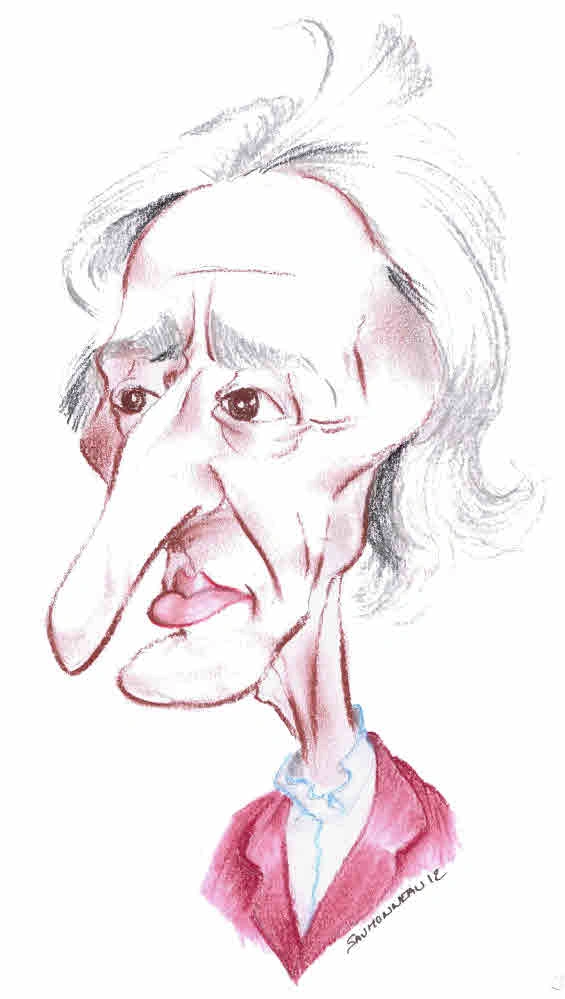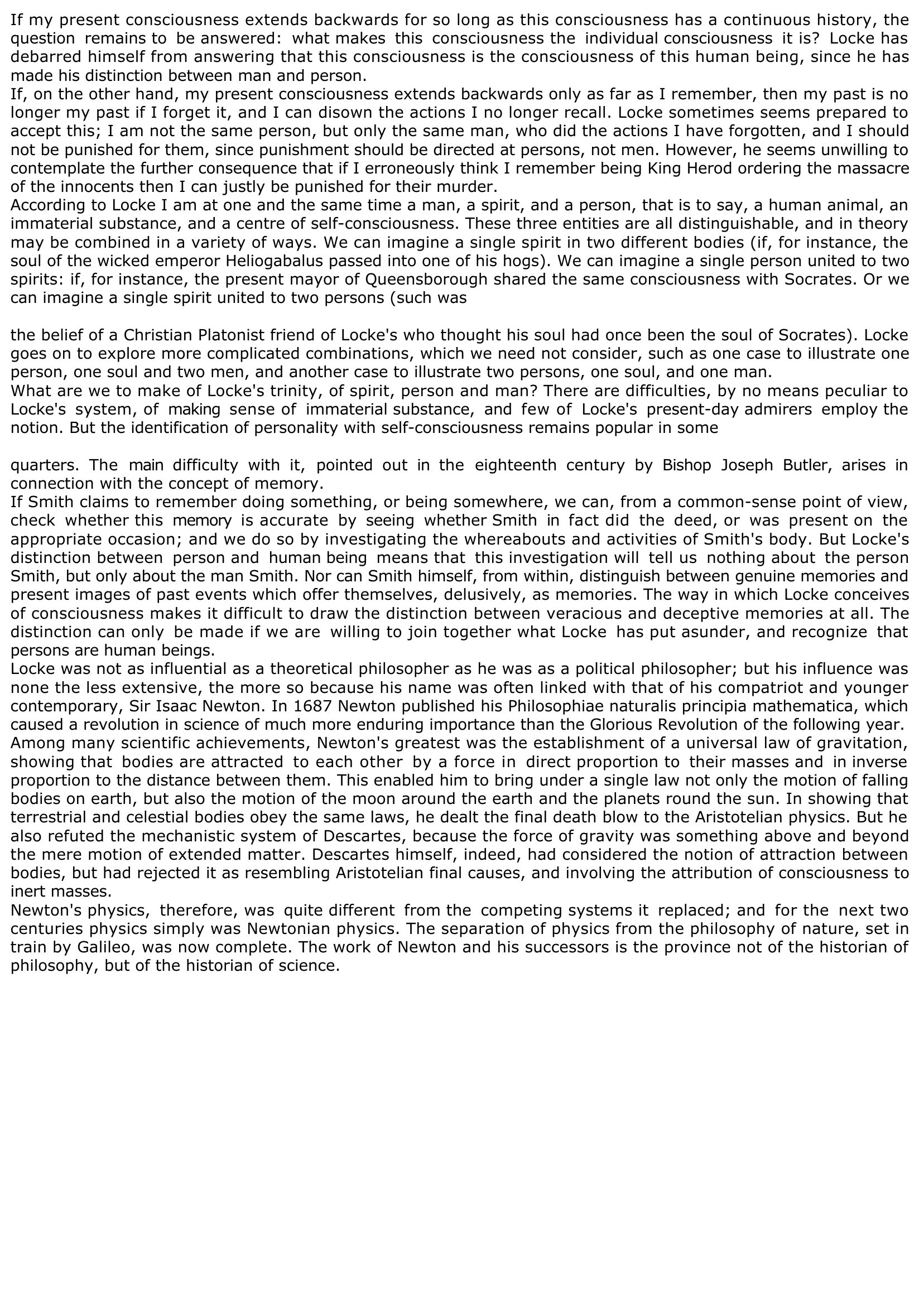SUBSTANCES AND PERSONS - LOCKE
Publié le 09/01/2010

Extrait du document

In the Aristotelian tradition, qualities, like other accidents, belonged to substances. In Descartes, too, the notion of substance is of prime importance. Locke says that the notion of substance arises from our observation that certain ideas constantly go together. No one has any clear idea of substance, but ‘only a supposition of he knows not what support of such qualities, which are capable of producing simple ideas in us'. The ideas of particular kinds of substance such as horse or gold are not simple ideas, but complex ideas. Locke calls them sortal ideas: collections of simple cooccurent ideas plus this general confused idea of a something, we know not what, in addition to its observable qualities. Particular substances are concrete individuals which belong to these different sorts or species. They fall into the two general categories of material and spiritual: material substances, which are characterized by the primary qualities, and spiritual substances, which are characterized by the possession of intellect and will and the power to cause motion.

«
If my present consciousness extends backwards for so long as this consciousness has a continuous history, thequestion remains to be answered: what makes this consciousness the individual consciousness it is? Locke hasdebarred himself from answering that this consciousness is the consciousness of this human being, since he hasmade his distinction between man and person.If, on the other hand, my present consciousness extends backwards only as far as I remember, then my past is nolonger my past if I forget it, and I can disown the actions I no longer recall.
Locke sometimes seems prepared toaccept this; I am not the same person, but only the same man, who did the actions I have forgotten, and I shouldnot be punished for them, since punishment should be directed at persons, not men.
However, he seems unwilling tocontemplate the further consequence that if I erroneously think I remember being King Herod ordering the massacreof the innocents then I can justly be punished for their murder.According to Locke I am at one and the same time a man, a spirit, and a person, that is to say, a human animal, animmaterial substance, and a centre of self-consciousness.
These three entities are all distinguishable, and in theorymay be combined in a variety of ways.
We can imagine a single spirit in two different bodies (if, for instance, thesoul of the wicked emperor Heliogabalus passed into one of his hogs).
We can imagine a single person united to twospirits: if, for instance, the present mayor of Queensborough shared the same consciousness with Socrates.
Or wecan imagine a single spirit united to two persons (such was
the belief of a Christian Platonist friend of Locke's who thought his soul had once been the soul of Socrates).
Lockegoes on to explore more complicated combinations, which we need not consider, such as one case to illustrate oneperson, one soul and two men, and another case to illustrate two persons, one soul, and one man.What are we to make of Locke's trinity, of spirit, person and man? There are difficulties, by no means peculiar toLocke's system, of making sense of immaterial substance, and few of Locke's present-day admirers employ thenotion.
But the identification of personality with self-consciousness remains popular in some
quarters.
The main difficulty with it, pointed out in the eighteenth century by Bishop Joseph Butler, arises inconnection with the concept of memory.If Smith claims to remember doing something, or being somewhere, we can, from a common-sense point of view,check whether this memory is accurate by seeing whether Smith in fact did the deed, or was present on theappropriate occasion; and we do so by investigating the whereabouts and activities of Smith's body.
But Locke'sdistinction between person and human being means that this investigation will tell us nothing about the personSmith, but only about the man Smith.
Nor can Smith himself, from within, distinguish between genuine memories andpresent images of past events which offer themselves, delusively, as memories.
The way in which Locke conceivesof consciousness makes it difficult to draw the distinction between veracious and deceptive memories at all.
Thedistinction can only be made if we are willing to join together what Locke has put asunder, and recognize thatpersons are human beings.Locke was not as influential as a theoretical philosopher as he was as a political philosopher; but his influence wasnone the less extensive, the more so because his name was often linked with that of his compatriot and youngercontemporary, Sir Isaac Newton.
In 1687 Newton published his Philosophiae naturalis principia mathematica, whichcaused a revolution in science of much more enduring importance than the Glorious Revolution of the following year.Among many scientific achievements, Newton's greatest was the establishment of a universal law of gravitation,showing that bodies are attracted to each other by a force in direct proportion to their masses and in inverseproportion to the distance between them.
This enabled him to bring under a single law not only the motion of fallingbodies on earth, but also the motion of the moon around the earth and the planets round the sun.
In showing thatterrestrial and celestial bodies obey the same laws, he dealt the final death blow to the Aristotelian physics.
But healso refuted the mechanistic system of Descartes, because the force of gravity was something above and beyondthe mere motion of extended matter.
Descartes himself, indeed, had considered the notion of attraction betweenbodies, but had rejected it as resembling Aristotelian final causes, and involving the attribution of consciousness toinert masses.Newton's physics, therefore, was quite different from the competing systems it replaced; and for the next twocenturies physics simply was Newtonian physics.
The separation of physics from the philosophy of nature, set intrain by Galileo, was now complete.
The work of Newton and his successors is the province not of the historian ofphilosophy, but of the historian of science..
»
↓↓↓ APERÇU DU DOCUMENT ↓↓↓
Liens utiles
- Locke on Ideas and Qualities
- Ideology and Rationality in the History of the Life Sciences
- Relationship between religion, spirituality, and young Lebanese university students’ well-being.
- Commentaire de texte Locke: chapitre 18, du livre 4 des Essais sur l'entendement humain
- Course of reading and writing for 1st year English Licence

































